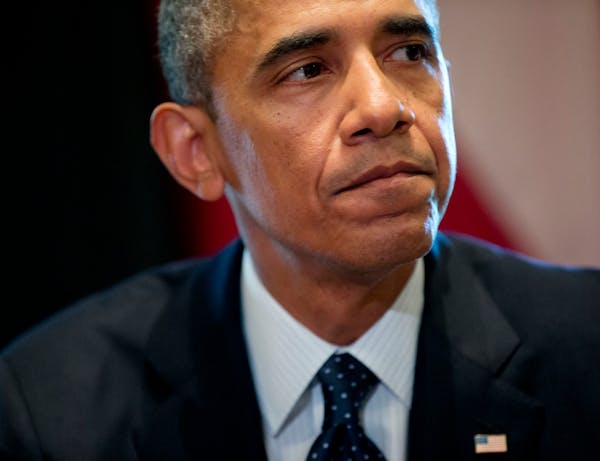SYRIA
The reasons for or against U.S. action
According to a statement in a Star Tribune editorial ("Obama's sensible delay," Sept. 1), the administration "has not yet presented a persuasive case … that a U.S. military strike would have the intended effect — to dissuade President Bashar Assad from ever again using chemical weapons to murder and maim his own people."
I respectfully disagree with that premise — on two counts. First, the intended effect is more of an attempt to dissuade other leaders from using chemical weapons. A strike would be a message that we will not tolerate such behavior anywhere.
Second, the phrase "his own people" overlooks the fact that Assad does not see the people he attacked that way. They are Sunnis. He is Alawite, a Shiite sect. His war is a struggle to maintain power over the majority sect in his country. If he loses that struggle, he suspects his people, the Alawites, will suffer greatly. That fear does not justify his behavior, but helps explain it.
A later statement in the editorial also requires an additional view. Agreed, "the civil war in Syria does not pose an imminent threat to this nation." However, the key word is "imminent."
President Obama is worried about a long-term threat. An unanswered use of chemical weapons could give encouragement to sources other than Assad that they can get away with using those weapons, too. We can't know at this point what will happen, but it appears to be one-dimensional to emphasize imminent threat only.
JIM BARTOS, Brooklyn Park
• • •
I cannot agree more that Syria's use of chemical weapons was beyond hideous and unforgivable and requires a response from the United States. What I cannot believe is that any military retaliation, however "surgical," will not kill many innocents — particularly the elderly and frail, women and children. Thus, to me a U.S. military retaliation could arguably be construed as very nearly responding in kind.
I love our country. It's my heartfelt hope that in this confounding, heartbreaking, dangerous situation the United States will choose "retaliation" from the high road, using the only "weapons" that can ultimately ensure our troubled world peaceful tomorrows — indefatigable restraint, compassion, and fierce intelligence.
CORAL BERGE, St. Paul
• • •
What the president, Congress and others won't say is that a major reason to act against Syria's weapons is to support Israel. Assad is already a pariah. If he has poison gas and nothing to lose, how long before he turns it on Israel?
No one will say it, particularly the Israelis, because of the need for support from the Arab states. But in addition to reinforcing the standard that gassing civilians is a grievous crime, we will be protecting our longtime ally.
DAVID HANSEN, Faribault, Minn.
• • •
UNIONS
Opponent unwittingly makes case for them
Although it was unintended, Annette Meeks has offered readers the promise of a brighter future for public education. She laments the current power of the teachers union and the warning that "union leaders won't give up this power without a mighty fight" ("It's been a good year for unions — too good," Sept. 2).
Education Minnesota is that union, and Meeks, CEO of the Freedom Foundation of Minnesota, credits it as the powerful force behind greater funding for schools — in higher education and special education, and in support of all-day kindergarten and increased per-pupil formula. These are high marks delivered by a union critic.
Despite her derogatory use of the terms "union bosses," the union is in effect thousands of certified, organized, power-wielding teachers who care more for the daily well-being of their students than does any shining politician or special-interest CEO. Union teachers rely directly on their union reps to get it right for kids.
But Meeks just can't stomach more dollars when Minnesota schools are, in her words, "already very well-funded." That out-of-bounds comment denies eight to 10 years of shrinkage in education funding and the current legacy: Minnesota leaders are still working off a colossal I.O.U. to teachers and schools.
Minnesotans should demand and celebrate a mighty fight from our teachers and their union. They are committed to neutralize any group whose stated mission is reduced to "economic freedom and limited government." Those two myopic goals — by design — undermine a thoughtful and complex system that brings education to our neediest.
STEVE WATSON, Minneapolis
• • •
CAMPAIGN FINANCE
Not just the amount, but how it's spent
According to the Star Tribune, about $290,000 was shelled out on my local state Senate race. The candidates, Bev Scalze and April King, spent a combined amount of $83,586. As for the rest of the money, $23,657 was expended in favor of Bev Scalze and $62,291 was used against April King; $28,995 was spent for King and $90,141 was disbursed against Scalze. So the amount that went into negative campaigning, $152,432, was about twice as much as that spent by the candidates themselves.
These numbers dwarf my contribution of $30 to one of the candidates.
More important, my son voted for the first time in 2012. Was he baffled, amused, or swayed by the negative campaigning he received by mail, phone and e-mail, or on TV? I feel like I didn't give him an adequate lesson in civics before he left the house.
I'm fantasizing about starting my own PAC called Patriotic Americans Against Negative Campaigning, or PAANC. It will be pronounced "PANIC," which is how I feel. The money raised could be used for lottery-type billboards that will total up the negative campaign funds used to influence my sacred vote.
Maybe I'll have to up my contribution to one of the candidates to $50 in the next election. I feel so inadequate.
MARGARET SEIBEL, Vadnais Heights
The courage to follow the evidence on transgender care

Republicans wanted a crackdown on Israel's critics. Columbia obliged.


